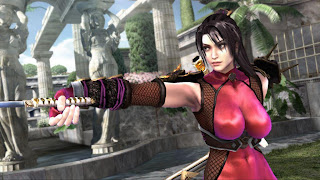Sony's monthly PS3 showthing rubs me the wrong way. Here are some reasons.
1) Veronica Belmont is too damn Qute. I can see the wheels turning in their funny little marketing noggins as they blow hard in the completely wrong direction. Sony knows most gamers are male, late twenties, early thirties, and what do males in that demographic like? Pretty, sassy, bubbly, young little chicas, and so they got the best they could find, stole her from C/Net or where ever she was, and stuck her in the show. Personally, I resent that. I would rather watch a balding old game journalist. It's nothing against Miss Belmont directly; she's a perfectly talented broadcaster. It's against Sony. Don't insult me by pandering to my carnal lust. A pretty girl won't get me to pay $3.00, watch your ads, and hear about games I would normally have no interest in. That doesn't work. I won't buy your show (you can't take a fart without gassing off on a code for a "free!!" episode anyway), and I still don't care about The Incredible Hulk or whatever you're trying to pander this month. It's a useless tactic.
Um, unless you're Soul Calibur IV, in which case, appealing to my carnal lust, and incorporating decent gameplay, got me. Boob physics. What can I say.
 I don't feel as guilty objectifying digital women. Plus, Taki here makes a more convincing paranormal investigator than Belmont makes a convincing games journalist.
I don't feel as guilty objectifying digital women. Plus, Taki here makes a more convincing paranormal investigator than Belmont makes a convincing games journalist.2) Veronica Belmont is obviously not part of the Belmont Qlan. Yeah, I get their plan. I see your scheme again, Sony. You want me to think, gee, a Belmont! If her legendary ancestors can slay vampires, surely that lends credibility to their descendant! Well, sorry, unless she can brandish a whip and/or take on Upside-Down Castle as well as Alucard, she's no Belmont of mine.
 Now this is a Belmont! Though, I admit, I can see a family resemblance. Is it the boots? The twig-thighs?
Now this is a Belmont! Though, I admit, I can see a family resemblance. Is it the boots? The twig-thighs?3) It bodes poorly for the health of our industry. It pains me to see Sony make the same mistakes every single console generation. So far, amazingly, it's panned out for them, but as they learn lessons, they happily throw any useful knowledge right out the window when it's time for a new machine, and this time, it's been worse than ever. Qore feels like another bid to convince the public that the PS3 is some fantastic multi-media machine. That may have worked when the PS3 was the cheapest, or at least a competitively priced, Blu-ray player, but these days, it just ends up looking like an expensive game machine without enough games and plenty of useless little doo-dads. The first-party titles have shaped up nicely, but the fact remains that Sony needs more robust third-party backing. The multiplatform releases, which should be better on PS3, usually still end up inferior to the versions on competing platforms, the third-party exclusives are absent (can you blame them?), and there just isn't enough interesting software coming from Japan, which was a huge strength for the PSone and PS2.
4) Qompletely overpriced. $3 a month? $25 a year? So you can advertise to me and give me journalism way below the bar of what I could get elsewhere for free? Are you kidding me?
 "Quick, bird! Whisper something insightful about video games that I can 'parrot' back! I got nothing!"
"Quick, bird! Whisper something insightful about video games that I can 'parrot' back! I got nothing!"5) Veronica called Aquanaut's Holiday "boring". "That's fine," you might be saying. "Everyone's entitled to an opinion." Sure, but has she played it? Of course not. A game journalist would should at least recognize the title, must be familiar with its history and well-versed in the Japanese games available for Sony's system, as it's one of the platform's main strengths historically, but she didn't even know what it was, picking it up off the shelf of a Japanese game store, making her pronouncement, and tossing it back. And they aired it, right in the segment! Sony to their own foot: "Hello there! Ready to be shot again?" Oh, that Veronica. Isn't she adorable? Now when Sony, or some kind, risk-taking third-party, decides to localize Aquanaut's Holiday, she can interview them about it and pretend it never happened. "I meant it was a shame it wasn't getting a US release when I said it was... Qoring! I said Qoring! Like HardQore!"
6) Qan't focus. But, in reality, Qore would never cover a game like Aquanaut's Holiday, or something the likes of brilliant Valkyria Chronicles that so desperately needs the marketing boost. Sony completely undervalues interesting, unique third-party software, which is, again, a huge part of what powered the PSone and PS2. Somehow it's always turned around later (uncomfortably later) in their systems' lifecycles, but here, when we need it most, they blither on about games that are already getting advertisement elsewhere. Why not champion some lesser-known titles and show what a far reach the PS3 could really have across the user base?
 Qome on. The best Japanese RPG so far this generation, and it sells 30,000 copies? What is wrong with you people?
Qome on. The best Japanese RPG so far this generation, and it sells 30,000 copies? What is wrong with you people?In the end, Qore is symbolic of Sony's mistakes and problems this generation, and if stuff doesn't turn around quickly, it's only going to get worse, and that's no good for anyone who loves this industry, whether you like Sony or not.
Take heart, though, Veronica; at least you're not Jessica Chobot.
Jesse Dylan Watson is platform agnostic; they can release on Super NES for all it matters to him.















